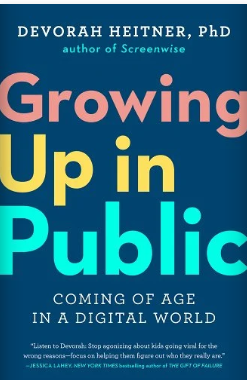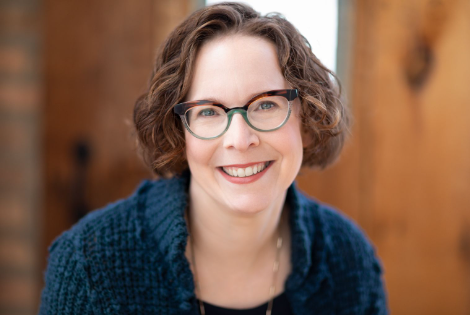Today’s Atlantic has a great piece called “The Very Common, Very Harmful Thing Well-Meaning Parents Do.” And what is that common thing?
TRACKING. As the article’s subtitle puts it bluntly: “Surveilling your kids will only backfire.” The piece is an excerpt from the new book “Growing Up in Public,” by Devorah Heitner.
We caught up with Heitner to talk about the ever-expanding adult supervision of kids. Contents have been edited for length and clarity:
LS: Devorah, Is everybody tracking their kids?
DH: I interviewed a professor at the University of North Carolina and she said college students’ parents are still tracking them.
LS: Wow! Well, how do you feel about Life360-ing, say, an 8-year-old?
DH: You’re accustoming them to being tracked.
LS: What if you just want to keep them safe?
DH: Do you want to communicate that level of vulnerability to them? That they are so unsafe, that they need to be tracked?
Tracking stunts child development.
LS: I think the availability of tracking sort of reverse-engineers our confidence in our kids and communities, making us feel that we MUST track our kids. But before tracking existed, we learned to trust them in the exact same situations – like walking to school – on their own.
DH: The reality is your kid is safer if they know how to yell for help and recognize a difficult situation. But if we’re always tracking them, they will be very reliant on us. You want them to know how to talk to strangers. You want the 8-year-old to say, “My little brother fell! Can I use your phone?”
LS: In other words, we want them to not automatically outsource all their problems to us. Yes! How do the kids themselves feel about being tracked?
DH: Some tell me they feel safer. They say, “I like it and I like tracking my parents right back.” They say it decreases the checking-in and nagging. But others feel resentful.
Tracking makes it harder to tolerate uncertainty.
LS: It strikes me as sad that kids who are tracked can’t prove to their parents that they’re trustworthy. After all: Are you, the kid, not going to the beach because you promised you wouldn’t? Or only because your parents can see where you are? There’s no way to prove you are actually responsible!
So, let’s talk about the opposite of tracking: Uncertainty – that uncomfortable feeling of just NOT knowing everything everywhere all at once.
DH: I think we need to practice living with uncertainty. [To that end,] don’t get your kid their first phone because you were five minutes late picking them up once. Let them know that you’re human and sometimes there’s going to be traffic.
LS: You mean, MAKE our kids experience uncertainty? For its own sake?
DH: Kids can tolerate more than we can imagine. I waited around for my parents all the time. If it was really extreme I’d borrow a quarter to call. We want them to have multiple strategies.
LS: In other words: When they CAN’T reach us immediately, they improvise. That’s very Let Grow. Now let’s talk about another kind of tracking: Class Dojo.
Tracking of kids in class makes school inescapable.
DH: Class Dojo is used in a bunch of elementary schools. It’s an app that parents can see. Teachers can use it for all different kinds of communication, but one is an adaptation of the behavior charts in the front of the room.
LS: It gives parents behavior updates on their kids.
DH: So potentially, a parent could see throughout the day their kid getting pinged for not raising their hand, or getting water without permission.
LS: The kids who fidget must really feel under the gun.
DH: What I heard also is that even the most self-regulated and compliant kids are getting more anxious about school. Even the ones who get only positive points will come home and say, “David turned in his homework and got an extra point, but I did, too, and DIDN’T get an extra point.”
LS: How is this different from old-time in-school discipline?
DH: It makes school a place you never escape. And for parents, it’s incredibly stressful. What am I even supposed to do with the information that he sharpened his pencil without permission?
And what about phones in schools?
LS: What about having phones in school? Are you against it?
DH: Kids having phones in schools is a given for most middle and high school students. My kid was told to take a picture of his locker combination. How would you take a picture if you weren’t carrying around your phone?
LS: What age are kids bringing phones to school?
DH: In elementary school you’re still seeing the [Gizmo-type] watches. In 4th or 5th, they have phones. The reality is: A lot of kids are checking their phones [throughout the school day].
LS: What do teachers say?
DH: They find it incredibly hard to teach. It’s hard to be as interesting as TikTok.
LS: What advice would you give parents, regarding phones?
DH: It depends on kids’ levels of independence. I don’t think walking three blocks to school [requires a phone]. But if they’re going across town to pick up a sibling, it might be important.
*
Devorah’s book is available here.
If you’d like to think about waiting to give your child a phone, the site Wait Until 8th has great resources.
And if you’d like your child to have some free time after school when their friends are available to play and aren’t on their phones, consider asking your school to start a Let Grow Play Club. The school stays open for mixed-age, loose-parts, no-devices free play.





4 Comments
It all sounds awful. I could maybe see putting a tracker on an under three year old in the form of a watch. Maybe. But I wouldn’t tell the child I was tracking her.
I’m trying to decide on a place to raise kids away from all of this nonsense, like Outer Mongolia. It helps that they’re not real yet.
I had an argument with my wife about how to raise our our teenage boys about a free range issue.
Her: They’re just children!
Me: No they’re not. They’re young adults!
Donald you are totally correct. Parents forget they are not raising children,they are raising adults. Every one wants their child safe all the time. The way to do this is not 24/7 monitoring but to teach them how to handle different situations. How incompetent must the child feel knowing their parents don’t trust them to do anything by themselves. No wonder their anxious and scared, they are never able to learn how
This is such a hot-button issue. I hear it very often from parents who feel that they need to know where their children are at every minute.
In addition to the impact on children, however, who is talking about the impact on parents and adults. We have created an environment of constant fear/concern/whatever that requires constant vigilance. This is not healthy for parents, either.
My brothers and I grew up without being constantly monitored, and yet, for the most part, people knew what we were up to. We were certainly seen at school. We were required to say where we were going when we rode bikes, even venturing downtown to the library on our own. If there was an excursion to the park, we had to let mom know. The assumption, at a certain age, was that we knew how to manage ourselves, usually with a brother or a friend. Our community of kids was essential, and since we had been taught values of safety, fair play, and so forth, it was a self-regulating community as well. Plus, we had to check in at lunch time, or for dinner. It might have been a fairly established structure, but within that we had some autonomy. And the freedom to make mistakes, be upset, and, yes, break bones on occasion.
My father always told us, “I trust you,” and for my brothers and me that carried huge weight. We wanted to be worthy of that trust. Did we push boundaries? Of course we did, we were kids. And years later when we were regaling mom with some of our antics, her reply was, “I’m so glad I didn’t know that at the time.”
But I go back to my initial question: What does a culture of hypervigilance do to the well-being of an adult. Set the kids up to be okay and responsible, and chances are it will be fine. Broken bones heal. (And they were a sign of playing too hard in our world.) Most people are friendly and supportive. Set ground rules. And relax.